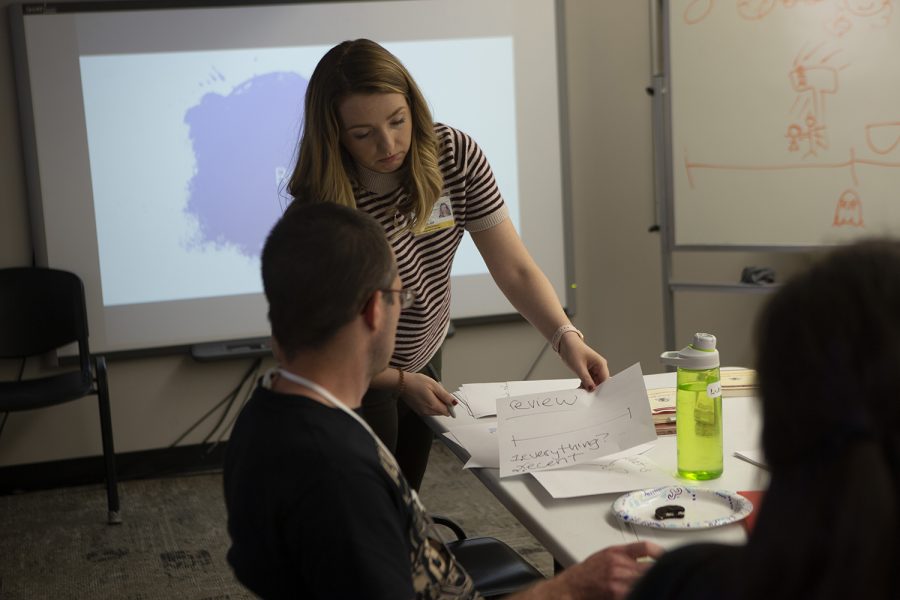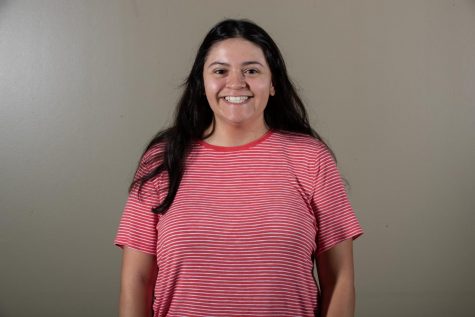Aphasia Reading Club provides safe space for individuals with communication disorders
The University of Iowa Aphasia Reading Club offers an out for those struggling with the communication disorder to have a community of support.
Club members review what they discussed in the previous meeting during a meeting of Aphasia Reading Club (ARC) on Tuesday, Oct. 8, 2019. ARC is a group for people with mild to moderate aphasia who have difficulties with reading comprehension.
October 9, 2019
For someone with aphasia — a neurogenetic communication disorder — reading, speaking, and writing can all be difficult actions to accomplish. The Apahsia Reading Club on campus and in Iowa City seeks to alleviate these difficulties.
University of Iowa Clinical Assistant Professor in the Department of Communication Sciences Jocelen Hamilton directs the reading club, which is a free service facilitated by graduate students and offered at the Wendell Johnson Speech and Hearing Clinic.
Hamilton described aphasia as a condition caused by stroke or brain injury that impairs a person’s ability to express and understand language. Her organization aims to support individuals that experience aphasia.
“The group itself enables people with aphasia to connect with others since the disorder tends to disrupt life,” Hamilton said. “It tends to be isolating… It can grossly impair their ability to connect with people.”
Hamilton and the graduate students involved in the group frequently use sheets of paper to write key words down from their questions and discussion to assist comprehension. Much like a classroom, the club uses a whiteboard and a projector to display images that help make sense of whatever story it’s reading.
At their meeting Tuesday, many group members expressed how the club opportunity helps them with their ability to communicate and discussed various ways that others can be helpful when talking with them.
“Everyone is different. What helps me doesn’t help everyone. You have to ask people what helps them most,” said Marilyn, a book club client. “It helps to read and discuss things out loud because sometimes I might miss details that I hear in discussion.”
According to the National Aphasia Association, more than 2 million Americans live with aphasia. Of the estimated 750,000 strokes that occur each year in the U.S., one-third will cause aphasia.
Some group members mentioned that when people finish sentences for them, it’s not necessarily helpful — even with good intentions. Extra stress and distraction can make the already difficult process of expressing themselves more exasperating.
“It is disruptive to try to fill in the words. Sometimes [it is helpful] when trying to find a word, but it can still disrupt the process of communication,” Marilyn said.
Benjamin Kost, a graduate teaching assistant in the communication sciences department, helps guide the club.
“In any session, we’ll try to incorporate small and large group activities,” Kost said. “In smaller groups when we break out, we’ll have the clients read, and the clinicians will help them.”
Each graduate student works closely with two or three clients over the course of the meeting while still having everyone involved working together. The graduate students are then responsible for tracking and quantifying the participation throughout the meetings.
RELATED: Growing in life through stuttering
Marilyn said others do not always have the patience necessary to slow down, listen, and communicate effectively with her. All the members of the group agreed with this sentiment.
“A lot of times people think that if you can’t communicate, your intelligence is impaired,” Hamilton said.
Group members said this simply isn’t the case.
“If someone has a physical disability, society takes responsibility with ramps or elevators,” Hamilton said. “[It’s important that] there’s a movement that society functions in a way to give communication ramps, to help produce methods to help communicate.”















